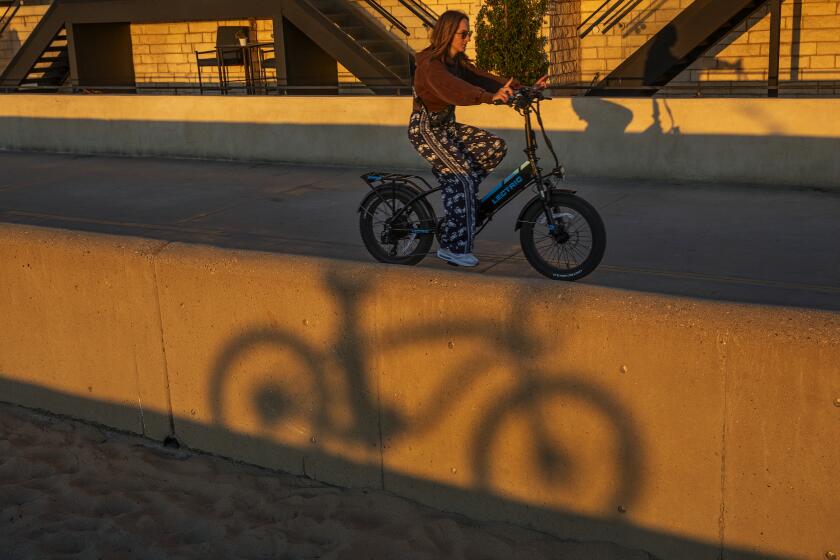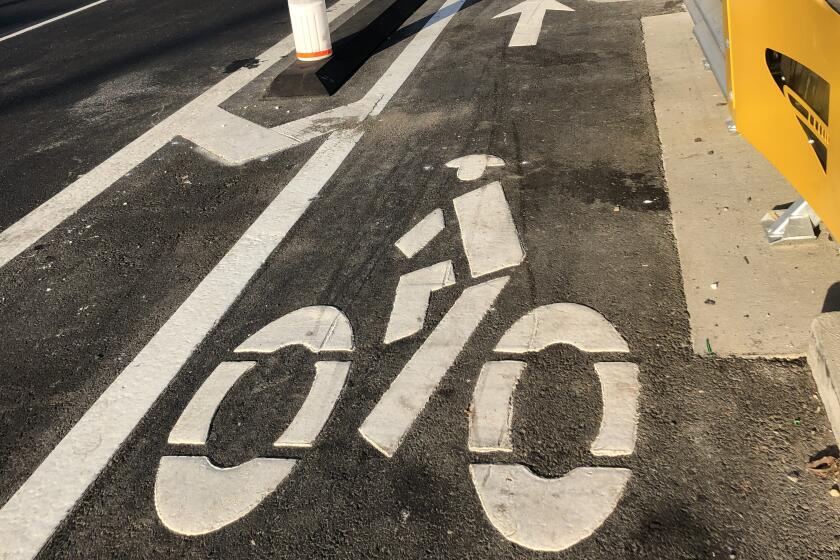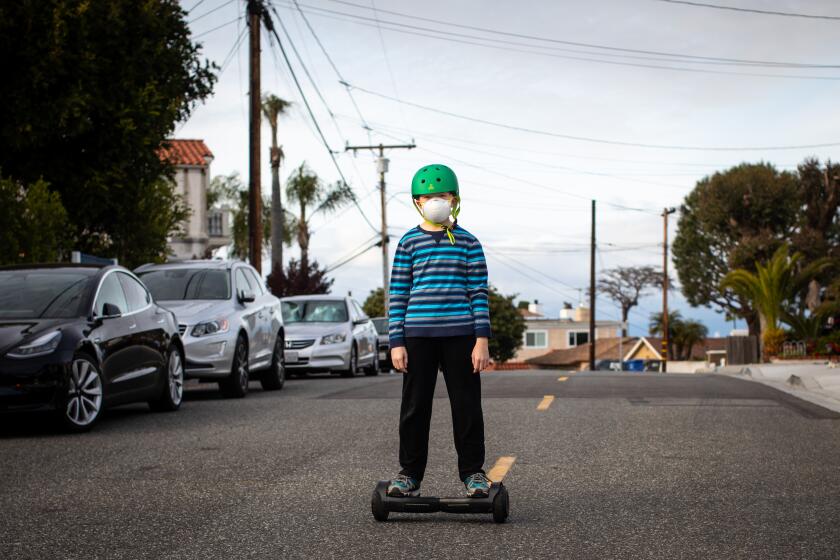Opinion: I thought I had my L.A. cycling commute down. Turns out, Iâd been missing the obvious

The other day I was biking home from Westwood to Venice, as I had for nearly a decade. At Wilshire and Gayley, the tripâs loudest, ugliest intersection, I noticed a guy straddling a 10-speed wearing scrubs. As cars sped by and an 18-wheeler blasted its horn, I nudged ahead and asked the man if he was in med school. Nope, he said in a precise German accent, he was a resident.
When I caught up to him again at Sepulveda, I told him his back wheel needed new spokes. He said he knew, heâd bought the bike for only $100, and wasnât riding the absolute best?
In the many years Iâd done this ride, this was the first time Iâd bonded so immediately with a stranger. At Barrington, before he turned right while I continued straight, Conrad (we had exchanged names by then) said, âYou must love riding the beach bike pathâ and waved goodbye.
I felt as if Iâd been hit in the stomach.
To understand how unnerving it is out there for cyclists, I might suggest you saddle up and pedal in a gutter bike lane during rush hour. But I could never recommend doing that.
I pedaled slowly for the next few blocks, not watching for opening car doors, broken glass or potholes. I wasnât coasting on the pride I felt in not using a car and getting exercise. I was feeling regret and embarrassment.
Despite my carefully curated way of moving through L.A. â having made a transition from motorist to cyclist that felt so special â I never once, in nearly 10 years of good intentions, bragging and evangelizing about cycling, had had the good sense to head farther west so I could finish the last few miles of my ride on the beach bike path that now seemed so obviously the best way to go.
When my family moved to Los Angeles in 2013, we bought a Honda and decided where to live, how we would get to work and which school our child would attend. After settling in Venice Beach, we secured a slot at an elementary school in Westwood, a few miles away. âHow bad could the commute be?â we naively thought. We soon found that at peak traffic times, the drive could take an hour. Traffic became part of our daily lives. Our kid lost their first tooth on the 405; my bumper once seemed to kiss a Mercedes; a woman T-boned me so badly that I saw stars. I felt miserable and trapped.
With safe, protected bike lanes and streets designed for humans, not only cars, we can have a future with an environmentally sound commuting option.
Then came the email that changed everything. My employer, the note said, would give me a new bike, but only if I gave up my parking pass. Soon enough, our kid was attending a Venice elementary school and our car was gathering dust on our block.
With a convertâs enthusiasm, I rode my bike everywhere. I deleted Waze, which thinks you can cross six lanes of traffic on Olympic without a light. I got a cool bike helmet, a decent lock and more and more strong opinions about not driving.
I nailed down the fastest, safest route home from my job in Westwood. I felt muscles tighten and instincts sharpen as I developed a cyclistâs feel for the flow of traffic. I memorized traffic lights and places I might get hit by a car door. I learned which stretches often had broken glass and bad potholes. When a friend visited, we did the route together. I couldnât imagine the routine getting any better.
Then, Conrad.
In an instant, his beach route comment did me a huge kindness and made me feel like an incurious boor.
Vehicle sizes have ballooned in recent decades, and now children would be unsafe on bikes. History shows us a better approach.
We got the kid all the way to high school, my employer valued me and I knew a good plumber. I voted regularly and had a pretty good smoothie recipe. But even though I bike on the beach at other times, Iâd never thought of riding a few extra blocks to avoid the last two miles of congestion and enjoy a beautiful bicycle ride through paradise every workday.
So that afternoon, I did it. At Colorado and Main, I continued straight, and there it was: the Pacific Ocean bathed in pinks and oranges. I pedaled by three bros holding hands and singing and city workers cleaning public toilets. I saw people doing calisthenics on the rings and ropes and the volleyball fields buzzing with competition. A lifeguard tower shutting down for the day. A woman in a leather pantsuit walking a dog dyed bright pink. A grizzled man singing into a microphone, his feet sandy and splayed.
I arrived home within minutes of when I usually would. And despite my frustration at the years I missed, I was delighted that I could go this way from now on.
In L.A., and indeed anywhere, itâs easy to fall into a groove, to stop looking around, to think weâve done well enough. It just took a brief conversation with a German guy named Conrad for me to make a slight change that delivered a massive upgrade. Something so small â right in front of me all along â felt so huge. Iâll be on the lookout for whatever else Iâve been missing.
Nathan Deuel is a continuing lecturer at UCLA and the author of âFriday Was the Bomb: Five Years in the Middle East.â
More to Read
A cure for the common opinion
Get thought-provoking perspectives with our weekly newsletter.
You may occasionally receive promotional content from the Los Angeles Times.













